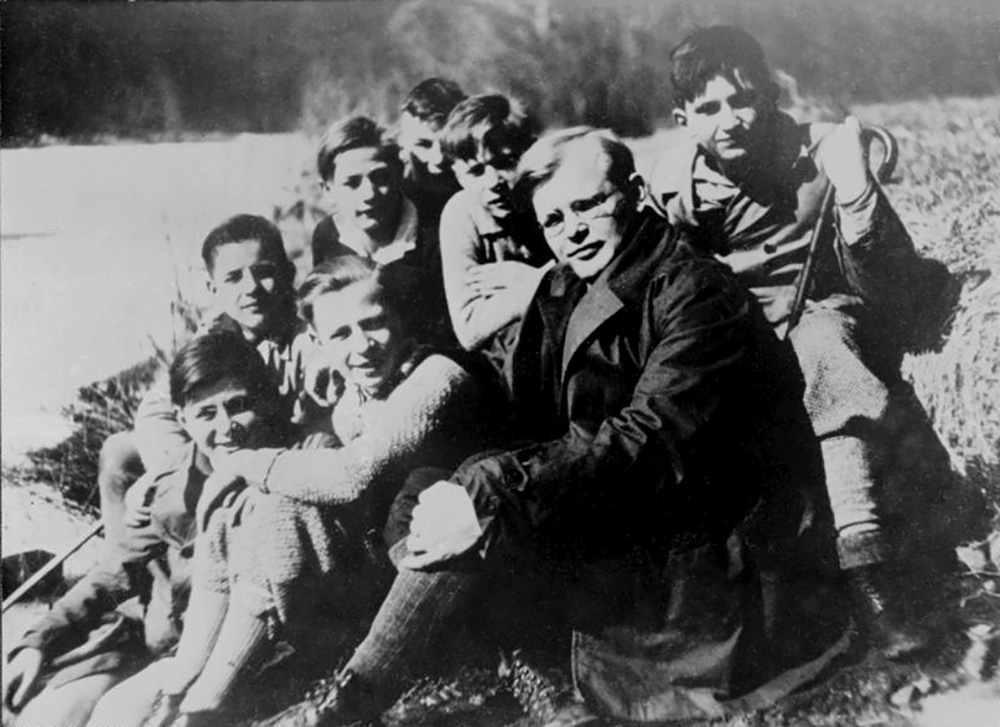
Lutheran pastor Dietrich Bonhoeffer with confirmation candidates on March 21, 1932, in Friedrichsbrunn, Germany (Wikimedia Commons/Bundesarchiv, Bild 183-R0211-316 / CC-BY-SA 3.0)
The November release of a major motion picture on the life of Dietrich Bonhoeffer has reignited a long-simmering battle between those who seek to learn from Bonhoeffer's life and those who seek to use it for their own purposes.
Members of the Bonhoeffer family have issued a statement expressing concern about the misappropriation of Bonhoeffer's legacy to support Christian nationalism over the past 14 years. In addition to their concerns about the historical drama film "Bonhoeffer: Pastor. Spy. Assassin.," they criticized conservative radio host and Bonhoeffer biographer Eric Metaxas, saying, "Never would [Bonhoeffer] have seen himself associated with far-right, violent movements such as Christian Nationalists and others who are trying to appropriate him today. On the contrary, he would have strongly and loudly condemned these attitudes. ... Bonhoeffer fought narrow-mindedness, oppression, and exclusion throughout his life."
Lead actors in "Bonhoeffer" wrote to express their concern about "the misuse of our film and the legacy of Dietrich Bonhoeffer by Christian Nationalists."
The presidents of the International Bonhoeffer Society have also objected to Metaxas' misuse of Bonhoeffer's legacy, saying that Metaxas "has manipulated the Bonhoeffer story to support Christian Nationalism" with a portrayal that "glorifies violence and draws inappropriate analogies between our political system and that of Nazi Germany."
So who was Bonhoeffer, and why do the people most dedicated to his legacy object so strongly to these attempts to reinterpret his story?

Jonas Dassler as Dietrich Bonhoeffer in Angel Studios' major motion picture "Bonhoeffer: Pastor, Spy. Assassin." Dassler was one of the actors in the film who penned an open letter to express their concern about "the misuse of our film and the legacy of Dietrich Bonhoeffer by Christian Nationalists." (Angel Studios)
Dietrich Bonhoeffer was a Lutheran pastor, theologian and college professor in Germany when the Nazis took power in the 1930s. He argued that Adolf Hitler's demand for total allegiance was a threat to the church, because only God is worthy of total allegiance. He taught pastors in an underground seminary who were members of the Confessing Church — a small group who resisted the Nazi regime's efforts to unite all Protestant churches behind its persecution of Jews — until he was stopped by the Nazis.
Metaxas wrote a biography of Bonhoeffer in 2010 and has a history of making connections between Nazi Germany and present-day America. He emceed a "Jericho March" in support of Donald Trump in Washington, D.C., on Dec. 12, 2020, in the lead-up to the Jan. 6, 2021, riot that interrupted Congress's proceedings to accept the results of the 2020 election.
American Letter Productions, the film division of Metaxas Media, produced a 2024 documentary titled "Letter to the American Church" featuring Metaxas, who wrote a 2024 book of the same name. Boise Bible College Professor John Whittaker described it as "alarmist," saying, "The overwhelming tone in both word and image is militant. One speaker contends that ... real men are warriors who do hard things, and what it pictures simultaneously on screen are military images and hand-to-hand combat training."
Writing in The Christian Century, Victoria Barnett, one of the general editors of the English edition of Bonhoeffer's voluminous writings, decried the "attempt to conform the Bonhoeffer story to our preconceptions."
The Bonhoeffer society presidents labeled a section of the Foreword to the Heritage Foundation's "Mandate for Leadership," known as Project 2025 as a "perfidious appropriation of Bonhoeffer." They said it misuses Bonhoeffer's teaching on "cheap grace" to "discredit protection of refugees and care for the environment," which Bonhoeffer would not have done.
Bonhoeffer's 1937 book, The Cost of Discipleship, is most famous for its analysis of the difference between "cheap grace" and "costly grace," the latter of which calls us to take up our cross and follow in the way of Christ.
Advertisement
Bonhoeffer takes the Jesus of Matthew's Gospel at his word. Like the rich young man, he would say, we are called to sell everything and give the money to the poor. When Jesus tells us to love our enemies, that means we must actively do good to them, not just pray for them. When we are mistreated, we are to relinquish our personal rights by turning the other cheek, never responding to violence with violence.
But most famously, Bonhoeffer joined the German resistance as a double agent and supported an effort by some of his family members to develop a plot to assassinate Hitler.
Did this make him a Christian nationalist? No. Bonhoeffer agonized over the contradiction between his prior teachings and his conclusion that Hitler needed to be stopped to prevent the killing of millions of Jews and the evisceration of the church. He accepted that his participation in the plot was worthy of God's judgment against him, even though he believed it was necessary.
It is "the free responsibility of the free man," he said, to put one's faith into action in the real world despite the spiritual risks. But those without power in society were central to his thinking. In a letter to members of the resistance, he wrote: "We have for once learned to see the great events of world history from below, from the perspective of the outcasts, the suspects, the maltreated, the powerless, the oppressed and reviled, in short from the perspective of the suffering."
It is perhaps this trademark belief that defenders find most lacking in those who misappropriate Bonhoeffer's legacy today.
There is much more to be gained from the teachings of Bonhoeffer.
Bonhoeffer loved his enemies, cared for the outcast, and never tried to promote or elevate himself. The real Dietrich Bonhoeffer is still worth emulating today.
See "Dietrich Bonhoeffer: Discipleship, Responsibility, Transformation" for a fuller analysis from the author of what Bonhoeffer taught and how he lived.






